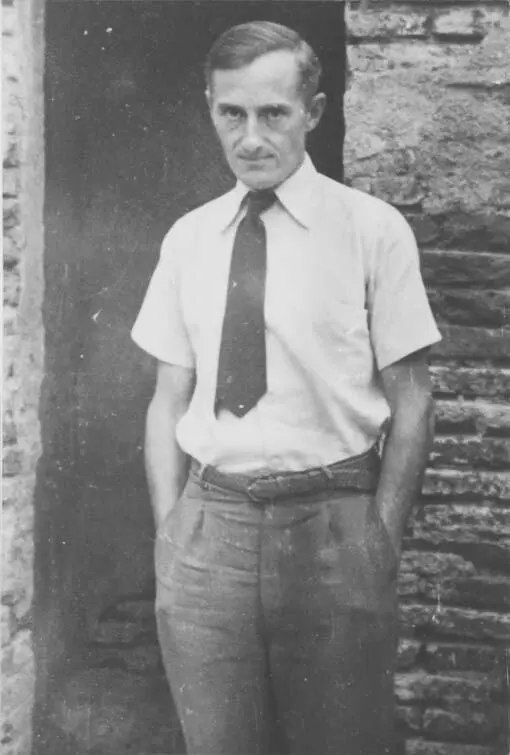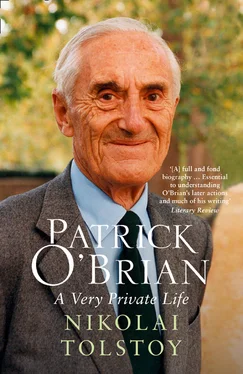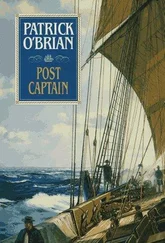Susan’s father, Paul Hodder-Williams, a director of the publishing firm of Hodder & Stoughton, was editor of Sir John Hunt’s bestseller The Ascent of Everest , which he was shortly to publish. The parents’ wealth and status in no way inhibited their friendliness to the shy but enthusiastic sixteen-year-old boy. As for their pretty daughter:
Seeing Susan again was terrific only her hair is a bit darker. She has gone back to school today. Ah. I asked her parents if I could take her out during the Christmas holidays, and to my delight they immediately said ‘Yes’, so that’s quite all right. Quite where to take her I don’t really know. Please could I have every suggestion however mad? She likes her bracelet. Soon she will be sending some of those photos that the girls took of her, they should be marvellous. She is still the same. What a wonderful girl she is.
In December my mother stayed with her parents in Chelsea, when she saw much of Richard. For him the outstanding moment was when she took him to see Richard Burton and Claire Bloom acting in Hamlet at the Old Vic. This was Richard’s first visit to the theatre, and he was enraptured by the ‘perfect’ production. Two days later he took my mother to the cinema, and a couple of days were spent in hunting down his first grown-up suit.
At Christmas Susan sent my parents a copy of Hilaire Belloc’s Cautionary Verses on behalf of her friends and their two schoolmistresses, thanking them again for their kindness throughout their stay at Collioure. Nothing more is recorded of this charming romance, which graphically illustrates my mother’s and Patrick’s talent for empathy with the young, especially in their amours. Within a few years they were to evince similar sympathy for me and my occasionally troubled youthful love affairs.
It was in August 1953 that ‘Mary [Burkett] took photographs of P for H[arper’s].B[azaar]. (only one came out, but it is very good).’
Eventually, as tended on occasion to occur, Patrick took mysterious offence at something Mary Burkett may or may not have done. In later years I came to know her, when I was able to reassure her that it was unlikely to have been in consequence of any particular offence on her part. Patrick’s writing was not going well at the time, and it was clearly in large part the strain which frequently made it hard for him to sustain close friendships at a remove. A chapter of Mary Burkett’s privately published biography is devoted to their friendship. Unfortunately, it includes much factual misrepresentation, despite the fact that when in August 2005 I stayed at her lovely home Isel House in the Lake District, we talked nostalgically of those long-departed days.[1]
A gift Mary had brought from England to Collioure long outlasted their friendship. On 21 July 1954 my mother cryptically recorded that ‘Mary Burkett arrived about 10, she brought us book-binding stuff.’ This was a parcel of early legal documents, which she had saved at a solicitor’s office clearance. Patrick tended to make heavy use of his beloved leather-bound books, with the result that their spines often became badly worn. In later years he replaced the damaged ones with strips cut from the sturdy paper used by seventeenth-century lawyers.

Patrick, photographed by Mary Burkett in 1953
Books so repaired, reposing comfortably on the bookshelves looking down upon me as I write, include his much-loved set of Johnson’s Lives of the Poets (1824), Camden’s History of The most Renowned and Victorious Princess Elizabeth, Late Queen of England (1675), Cowley’s Works (1681) and Thomas Stanley’s History of Philosophy (1743). Of particular interest is Patrick’s copy of William Burney, A New Universal Dictionary of the Marine (London, 1815), upon which he largely relied for his understanding of the workings of the Royal Navy in the eighteenth century, before he subsequently acquired the yet more apt Falconer’s An Universal Dictionary of the Marine (1769). Normally such amateurish repairs would detract greatly from the collector’s value of the books. However, in this case I find them enhanced, being constantly reminded of the pleasure they afforded their impassioned owner.
The year 1954 opened with an accruing worry inflicted on the hard-tried couple, whose financial situation remained precarious as ever. Patrick’s son Richard had always encountered difficulty with academic work. He would be seventeen in February, and the time had approached when he must consider a career. His ambition to enrol at the Royal Naval College at Dartmouth having proved sadly abortive, it became essential to find a satisfactory alternative. It was a worrying prospect, not alleviated when on 15 January my mother noted: ‘R’s report came: very sad.’
However, their overriding concern was with his well-being. Richard and his friend Bob Broeder had become cycling enthusiasts, which involved them in many adventurous exploits – of which their parents fortunately remained unaware. On occasion they would ride as far as Brighton, a hundred-mile round journey, and took to recklessly hurtling at some 60 mph down precipitous Reigate Hill, after removing their brakes. Bob recalls that:
One of our many dangerous [feats] and in retrospect foolish to the extreme, was to slip stream motor vehicles on our bicycles – normally lorries. Our favourite was to sit in wait for a BOAC coach coming from Heathrow to the air terminal in Gloucester Road. We would tuck in behind it and travel the length of the Great West Road at great speed and then overtake it at the Chiswick roundabout!
Eventually Richard became involved in a serious accident. Cycling home one day in the rain from games (a mode of transport conveniently enabling them to pocket their bus-fare allowance issued by the school), he crashed when making an awkward turn in the middle of Hammersmith Broadway. Skidding, he shot beneath a car ‘and cut myself to ribbons’. His prime concern was for the precious bicycle, whose frame was badly bent. The insurance company proved uncooperative, on grounds that the car was stationary at the moment of impact.
The repair was estimated at £10 13s. What could he do? Without his bicycle, he explained, he would have to start spending money daily on buses: could he possibly be sent £10? Patrick despatched a cheque by return of post, but the worry about Richard’s school progress – or lack of it – remained. Along with the cheque he sent practical advice to his son on mending his ways: he must apply himself consistently to his studies, answer correspondence by return, and generally become more self-disciplined. Richard responded with touching promises to mend his ways.
Although his intentions were good, school progress continued its downward slide. Towards the end of April, a letter arrived from his mother ‘enclosing a complaint from school about poor R’. By June he was agonizing over the imminent School Certificate examination (GCE), as his work became increasingly demanding and difficult. Alas, struggle as he might, the task proved too much, and he failed disastrously.
This unhappy news was not altogether unanticipated, and Patrick and my mother urgently discussed what was to be done. There was also the question of which branch of national service (the compulsory two years’ military service) would be suitable. Richard suggested: ‘Perhaps the Marine Commandos but one has to volunteer for five years and my mother does not like that. Then a friend suggested the engineering side; there to learn about mechanics. But please send your advice, because in the past it has always worked out well.’
Читать дальше













